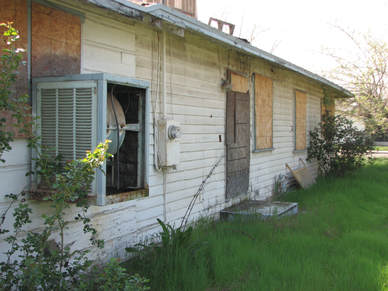 I wrote this a few years ago, and it appeared in Home Energy Magazine. Much of it is still true. Enjoy! We hear in the news about all the foreclosed, abandoned, vacant or otherwise lost homes. We hear about the army of house flippers and people buying and fixing these homes to make an income from them, whether it’s by reselling or renting them out. Now we’re also hearing about rising sales prices and lack of inventory. How does an energy conscious person fit into this arena? Why should one even bother? Lots of money is being poured into getting and fixing these lost homes, certainly because money can be made by doing so. Memphis Invest www.memphisinvest.com commissioned a study last September which found that private investors put 9.2 billion dollars a year into fixing up their real estate purchases. The average is $7500 per home/unit, though 16% spend over $30,000. The study found real estate investors are spending over four times what the Federal Neighborhood Stabilization Program is spending to rehab housing. Eleven percent of all Americans own real estate. Three percent of all Americans (or about seven million people) think of themselves as real estate investors. So, ponder for a bit what might happen if energy conscious people decided to jump into the fray and become investors. First, although housing prices are beginning to rise, there has been no better period in most of our lifetimes to take control of properties to make them durable and efficient. The Great Depression might have been the last such opportunity. The best time to rehab a place is when nobody is living in it. Cellulose insulation and drywall dust just aren't appetizing. Also, working by the hour has its limits. Finding a way to create an income that happens even if you take a day off has some appeal. This could be called rentals, or becoming an energy efficient landlord. Appreciation of property is something to hope for but not count on. Perhaps appreciation is best thought of as retirement income. Real estate is also a relatively safe investment. It seems the FDIC has funds to cover only ¼ of one percent of deposits and securities in banks http://www.youtube.com/watch?v=Y1lX-ZkbUIA and only Who knows where the emotion driven stock market is headed! Additionally, many of the well-to-do people in the world got that way with real estate. It's got a proven record and has intrinsic value, unlike paper money. Now if energy aware people get involved in housing and replace the lipstick flippers, the opportunity to make a difference really grows because homes aren't often available for being given an energy make over during their lifetimes. They remain occupied, often for decades. Sometimes the flippers aren’t all that good at fixing up houses, http://activerain.com/blogsview/2019273/mr-jay-s-neighborhood-meet-flipper and all that lipstick will keep the house stuck together and unavailable for real repairs for a while! Appraisers are ever so gradually moving towards recognizing the value of energy improvements, so loans may be able to take these improvements into account some day. Another thing that happens when we replace the lipstickers, is we have steadier work as energy aware, RE investors because we control the job. No more need to try to make prospective clients see the light, because we ARE that client. Additionally, if we get “scary” homes; those cheap ones that look like a lot of work, we can save them from simply being demolished and sent to the dump. That can add up to some serious embodied energy savings. Many benefits can come from our involvement. What do these homes look like; where are they and how do you find them? We are used to thinking of bank foreclosed homes coming up for sale on the local multiple listing service (MLS). Foreclosures range from multi-million dollar mansions to hovels that sell for a few thousand or less and they are in every state. They are in run down war zones in the bigger cities and in quiet countryside, way out of town. As a rule of thumb, if you’re on the coast go inland a bit and the deals will begin to appear. Sadly, MLS is no longer a good or reliable source of deals. There simply is too much competition. I've found that tax deed sales can be a good way to find and obtain neglected properties. These appear online at places like Bid 4 Assets, http://www.bid4assets.com or in person at the local county seats. Roughly half of the states in the US are “deed states”. A good source of information on tax deeds and more is at Tax Sale Resources. http://www.taxsaleresources.com HUD Homes can be another source, http://www.hudhomestore.com . Even writing letters to the owners of dilapidated properties can bring results. Also, it just might be a good time to locate a Real Estate Investment Club in your area http://www.reiclub.com/real-estate-clubs.php and attend a few meetings. Perhaps we can infiltrate the clubs and convert its’ members into energy aware people! There is a lot to the business of real estate, with many, many flavors. There is a lot to learn. How does one get involved? Where is funding? What rules exist for keeping out of trouble? One of the better sites to get this sort of know-how for free is Bigger Pockets, http://www.biggerpockets.com Much information is shared there. It comes from “brand new to real estate” types on up to those who have been involved thirty years or more. There are lots of good real estate books as well and using “info per dollar” as a yardstick, books are a dramatically better deal than the gurus! There is one very good example of “bringing wow and green to foreclosed homes” with Dave Robinson’s “Green Earth Equities” http://greenearthequities.com. He sets a good example for what I’m talking about and offers up a lot of information useful to the energy conscious person, with a nice mix of science and practicality. Once you’re looking at specific properties, websites like City Data, http://www.city-data.com will give you lots of detail about any given area and Crime Reports, https://www.crimereports.com or the like will tell you if it’s a war zone and you should be looking elsewhere. Also there is much that can be learned by going to public records, http://publicrecords.onlinesearches.com and browsing through the official information or simply contacting the officials themselves, whether they are in the building department, recorder’s office or with the tax collector. I’ve focused on internet information so far, but ultimately, nothing beats actually looking at a property. The vast internet can’t tell you if the house that looks so nice on Google Earth has just burned down, so always go look. The neighbors might be willing to share some of the history of the property as well. Once you have a specific property in mind, how do you determine if it’s worthwhile? One old landlording rule of thumb is that you want to get 1% per month. This means as a gross number you want rent to be at least 1% of the total money you have put into a place. For example, if you bought a house for $150,000 and put $50,000 into repairs you would want $2000 per month in rent. This assumes you will be doing the property management. Otherwise you want to get more like 2% per month as managers usually charge around 10% of rents. Another thing to keep in mind as energy minded rehabbers, is we need to know beforehand how much can be spent on improvements and still have a cash-flowing property. It’s going to be hard to justify turning all your rentals into passive-houses. Becoming a landlord is scary to many people, but that comes from lack of good information on just how to do it. I can suggest a good book called “Landlording” by Leigh Robinson. It’s in its 11th edition and has saved me countless troubles. To close, I hope I’ve created a bit of interest in real estate. Putting energy conscious people together with distressed homes can create that authentic win-win and moves us forward in a positive way. Yours, Larry
0 Comments
|
Larry Weingarten
Looking back over my working life of 50+ years, it seems clear that self sufficiency has always been the best way for me to be useful. Now, mix in a strong interest in water in its many forms and the wide world of animals and you'll know what's important to me. Archives
January 2023
Categories |
Copyright © 2014 - 2023
All Rights Reserved
All Rights Reserved



 RSS Feed
RSS Feed